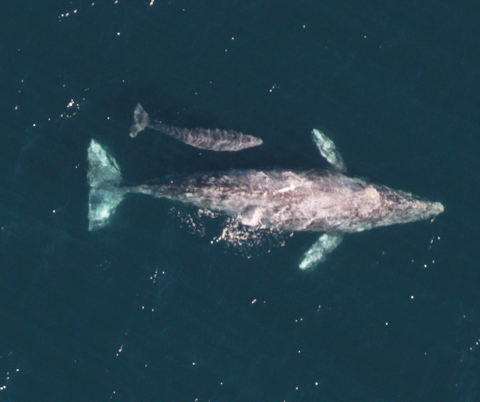Learning From Whales: Oxygen, Ecosystems and Human Health (2024-2025)
Background
Hypoxia occurs when tissues are deprived of an adequate oxygen supply and is highly relevant to human disease across multiple clinical settings, including heart attack, stroke, COVID-19 and cancer.
While human organs are poorly equipped to handle oxygen deprivation, deep-diving whales have adapted an exquisite tolerance for hypoxia, demonstrated by their ability to dive deep, often for hours, while foraging. Studying marine mammals may be the key to developing new ways to protect hypoxia-sensitive species and create new clinical interventions for hypoxia in relation to human health.
Project Description
Previous teams have used genetics to identify cellular adaptations of deep-diving marine mammals and uncover candidate genes that help these animals cope with low oxygen (i.e., hypoxia). They have pinpointed how stress impacts these cellular pathways and have demonstrated differences in the respiratory capacity between marine mammals and terrestrial mammals. Past team members also helped to find variation between inshore and offshore bottlenose dolphins and investigated a potential new ecotype for bottlenose dolphins and its conservation implications.
In 2024-2025, the team will use molecular biology, bioengineering and systems biology to enhance the understanding of whale behavior and genetics. Team members will continue to investigate the molecular mechanisms by which marine mammals tolerate hypoxia and link their findings with novel human health interventions.
The team will also conduct genome resequencing in bottlenose dolphins to identify genetic differences between deep- and shallow-diving populations. Team members will have the opportunity to collaborate with external partner Dolphin Quest in Oahu, Hawaii to collect and analyze dolphin blood samples, providing unique access to both physiological measurements and samples from managed-care dolphins under controlled conditions.
In a parallel approach, the project team will generate novel 3D organoid cultures of whale hearts using previously published protocols to reprogram cells. This will enable the team to study responses to hypoxia, ischemia and pressure in these 3D models, which more closely represent tissue and organ systems, and connect genetic differences in whale and terrestrial organisms with the physiologic function of their organs.
Anticipated Outputs
Peer reviewed manuscripts; conference presentations; science communication website; grant applications
Student Opportunities
Ideally, this project team will include 1-2 graduate students and 5-6 undergraduate students with interests in biology, earth and ocean sciences, environmental sciences and policy, marine science and conservation, biomedical engineering, marine medicine, molecular biology and/or science communication. Applicants can be based in Durham or at the Duke Marine Lab in Beaufort. Prospective graduate applicants should be interested in building mentorship and project management skills. Dr. Jillian Wisse will serve as project manager.
Team members will work across disciplines within subteams focused on complementary aspects of the project. Students on the team will be encouraged to volunteer for tasks and create their own research questions. They will gain field experience in ethical and safe ways to collect samples from wild marine mammals. All team members will participate in journal clubs, lectures and seminars, and will have the chance to gain experience in data collection, fieldwork, leadership, analysis and dissemination of scientific results and science communication.
In-person and online group meetings will connect team members from main campus and the marine lab. All team members will have the opportunity to travel between Durham and Beaufort for fieldwork during the school year. Students will also have the opportunity to travel to work with external partner Dolphin Quest in Oahu, Hawaii.
Timing
Fall 2024 – Spring 2025
- Fall 2024: Start data analysis and lab work; collect field data; engage in student-driven independent study projects
- Spring 2025: Complete collection of field data; continue data analysis and lab work; write, review, and submit manuscripts; prepare grant proposals
Crediting
Academic credit available for fall and spring semesters
See earlier related team, Learning from Whales: Oxygen, Ecosystems, and Human Health (2023-2024).
Image: Aerial view of gray whale cow and calf, by Wayne Perryman NMFS/SWFSC/PRD, NOAA Fisheries

Team Leaders
- Nicola Quick, Nicholas School of the Environment
- Thomas Schultz, Nicholas School of the Environment-Marine Science and Conservation
- Jason Somarelli, School of Medicine-Medicine: Medical Oncology
- Jillian Wisse, School of Medicine-Medicine
/graduate Team Members
-
Greg Merrill, Ecology-PHD
/yfaculty/staff Team Members
-
Andrew Read, Nicholas School of the Environment-Marine Science and Conservation
-
Zachary Swaim, Nicholas School of the Environment-Marine Science and Conservation
/zcommunity Team Members
-
Ashley Blawas, Goldbogen Lab, Hopkins Marine Station, Stanford University
-
Dolphin Quest
-
Andreas Fahlman, Fundacion Oceanografic
-
Kelsey Fisher-Wellman, East Carolina University
